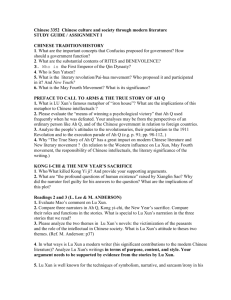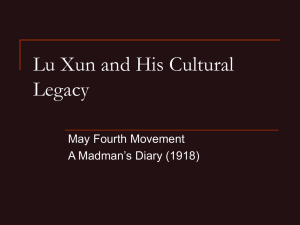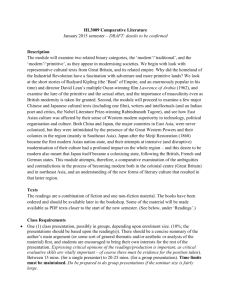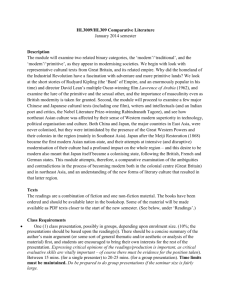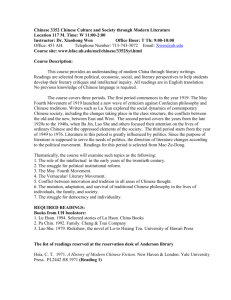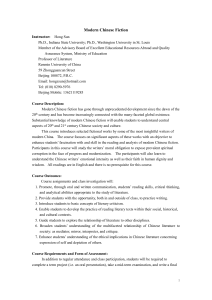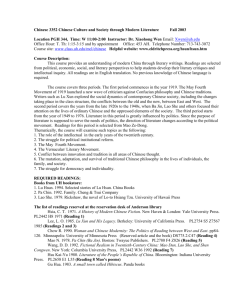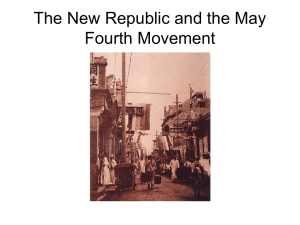Lu Xun, Leon Trotsky, and the Chinese Trotskyists
advertisement
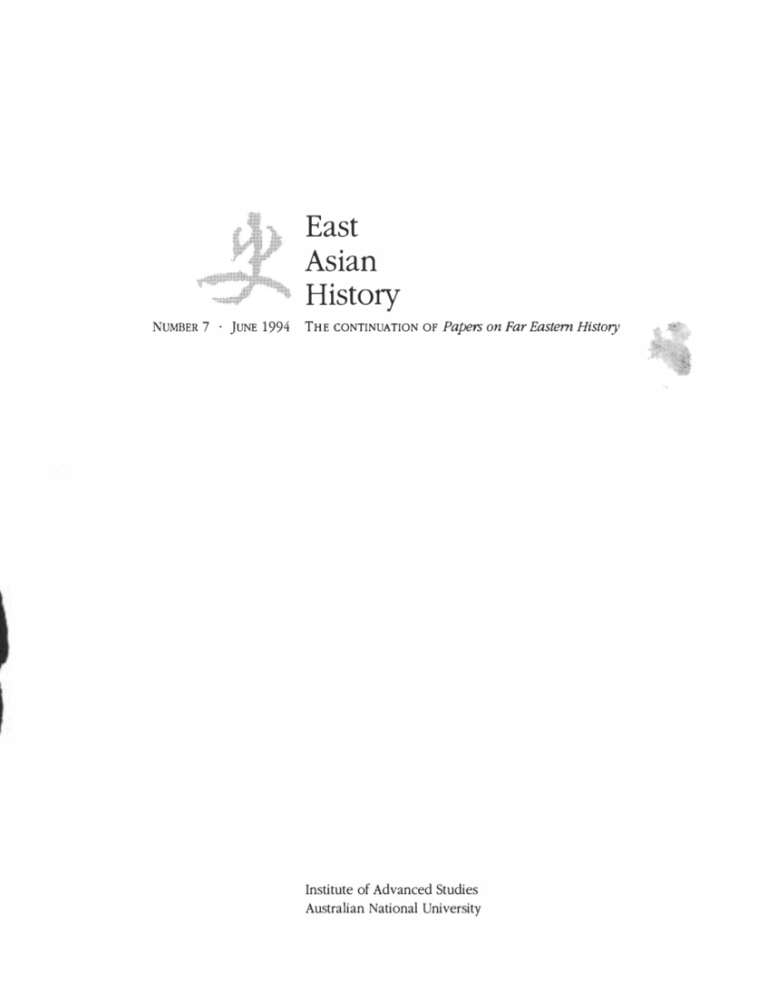
East
Asian
History
NUMBER
7
.
JUNE 1994
THE CONTINUATION OF
Papers on Far Eastern History
Institute of Advanced Studies
Australian National University
Editor
Geremie Barme
Assistant Editor
Helen Lo
Editorial Board
John Clark
Mark Elvin (Convenor)
Helen Hardacre
John Fincher
Andrew Fraser
Colin Jeffcott
W.J .F. Jenner
Lo Hui-min
Gavan McCormack
David Marr
Tessa Morris-Suzuki
Michael Underdown
Business Manager
Production
Design
Printed by
Marion Weeks
Helen Lo
Maureen MacKenzie, Em Squared Typographic Design
Goanna Print, Fyshwick, ACT
This is the seventh issue of East Asian History in the series
previously entitled Papers on Far Eastern History. The journal is
published twice a year.
Contributions to
The Editor, East Asian History
Division of Pacific & Asian History, Research School of Pacific & Asian Studies
Australian National University, Canberra ACT 0200, Australia
Phone +61 6 249 3140
Subscription Enquiries
Annual Subscription
Fax +61 6 249 5525
Subscription Manager, East Asian History, at the above address
Australia A$45
Overseas US$45
(for two issues)
iii
�
1
CONTENTS
Creating the Frontier: Border, Identity and History in Japan's Far North
Tessa Morris-Suzuki
25
The Search for Korea's Past: Japanese Colonial Archaeology
in the Korean Peninsula (1905-1945)
HyungIIPai
49
Korean Echoes in the No Play Fum
Royall Tyler
67
Emperors and Musume: China and Japan 'on the Boards'
in Australia, 1850s-1920s
Darryl Collins
93
Lu Xun, Leon Trotsky, and the Chinese Trotskyists
Gregor Benton
105
Unwitting Partners: Relations between Taiwan and Britain, 1950-1958
Steve Tsang
iv
MtJumn, Tang calligrapher and statesman
Cover calligraphy
Yan Zhenqing
Cover photograph
Dolmen in Hwanghae-do Unyul-gun (ChOsen S6tokufu, ChOsen koseki
zuJu [Album of ancient Korean sites and monumentsl, vol.2 [KeijO,
191 5])
LU XUN, LEON TROTSKY, AND THE
CHINESE TROTSKYISTS
�
Gregor Benton
Probably the first and certainly the finest Chinese writer to be strongly
influenced by Leon Trotsky's theory of art and literature was Lu Xun 1hB,
the universally acknowledged giant of modem Chinese writing. 1 Yet literary
historians have paid scant attention to this intellectual bond between Lu Xun
and Trotsky;2 and in China, where for many years the safely dead Lu Xun
has served as an icon of political orthodoxy, knowledge of his link to one
of the Communist International's hairiest bugbears has been systematically
suppressed. Lu Xun has even been portrayed by the Chinese authorities as
an implacable opponent of the Trotskyists, whom he allegedly held in
deepest political contempt. In 1993, however, new evidence emerged that
would seem to discredit this view of him, and at the same time to right a great
wrong committed against the TrotskyiSts more than half a century ago by
their enemies in the Chinese Communist Party (CCP).
Lu Xun read Literature and Revolution, a key text that contains the
essence of Trotsky's thought on literature,3 in Japanese translation; he
sponsored its translation into Chinese by Wei Shuyuan:=f1� 1m (from Russian)
and Li Qiye
�#Jf
(from English), but Wei died of tuberculosis, so the
translation was done by Li alone, and published in 1926. Lu Xun himself
translated (fromJapanese) Trotsky's long speech delivered at the meeting on
literary policy organised by the Central Committee of the Communist Party
of the Soviet Union on May 9, 1924, 4 and in 1926 he translated (also from
Japanese) the third chapter, on Alexander Blok, of Literature and Revolution
for an appendix to a translation published by Weirning Congshu *�M�
(Unnamed Library), under Lu Xun's editorship, of Blok's famous poem "The
twelve."s In April 1927 Lu Xun, echOing Trotsky, said of 'people's literature'
that it "is nothing of the sort, for the people have not yet opened their mouths.
These works voice the sentiments of oniookers."6
93
1 For an analysis of Trotsky's views on
literature, see Baruch Knei-Paz, tbe social
andpolilical thought o/Leon Trots.(ry(Oxford:
Clarendon Press, 1978), pp.289-301.
2 A connection between the two thinkers is
briefly noted in Paul G. Pickowicz, "Qu
Qiubai's critique of the May Fourth generation:
early Chinese Marxist literary criticism," in
Modern Chinese literatulT! in the May Fourth
era, ed. Merle Goldman (Cambridge, Mass.:
Harvard University Press, 1977),pp. 351--&i,
at 368.
3 This boo k was published in Moscow in
1923 as Literatura i revolyutsiya. For an Eng­
lish translation see Leon Trotsky, Literature
and revolution, tr. Rose Strunsky (Ann Arlx>r,
Mich.: University of Michigan Press, 19(0).
4 I have this information about the translation
into Chinese ofTrotsky's writings on literature
from Wang Fanxi, in a personal communi­
cation. See also Hui Quan
��
(Wang
Fanxi £FL l®, "Zhongyiben chuban xiaoxu"
[Translator's preface to the Chinese edition),
Tuoluociji (Trotsky),
Wenxue yu geming
[Literature and revolution),
tr.
Hui Quan
(Hong Kong: Xinda Chubanshe, 1971), pp.l3. According to a Western study, "Lu Xun
and other members of the Unnamed Society
translated Trotsky's
Literature and Revolu­
tion." (See Pickowicz, "Qu Qiubai's critique,"
p.367.) The most recent Chinese translation,
in this case from the Russian, of
Literature
and revolution, is Tuoluociji, Wenxue lOVER
94
GREGOR BENTON
It is interesting to note that Lu Xun's sponsorship in 1926
Figure 1
of the translation of Trotsky's writings dearly postdated
Leon Trotsky (photo courtesy of Alex Buchman)
Trotsky's break with Stalin. On May 22, 1929, three months
after Trotsky's final deportation from the Soviet Union, Lu Xun
(in a talk to Yanjing University's Chinese Literature Society) was
still openly expressing the same point of view as Trotsky on the
relationship between politics and literature? He stopped
referring to Trotsky's theory after 1929, probably for diplomatic
reasons, but its rejection as vulgar and ignorant of the idea that
culture merely mirrors economic interest continued to infonn
his lifetime's work.8 Like Trotsky, Lu Xun believed that the arts
must be a sphere unto themselves rather than some artificial
product of official decrees.
Lu Xun's propagation of Trotsky'S libertarian and pluralist
theory of art and literature directly or indirectly inspired the left­
wing writers Wang Shiwei
�II$, Xiao Jun
�1f,
.£�,*,
and Ai Qing
Ding Ling
)tW',
T�, Luo Feng
persecuted by the
Maoists in Yan'an in 1942. It also appears to have swayed the
literary thinking of Hu Feng $lJXI., a poet and maverick literary
theorist who-though himself a Stalinist-was rarely out of
trouble with the Party and in 1955 became the object of a
nationwide ideological campaign because of his opposition to literary
Figure 2
dictation by the Jeadership.9
The overt Trotskyist connections of Wang Shiwei, the principal figure in
Hu Feng, Shanghai, 1934
Yan'an's literary opposition, are well known,l° but the apparent origin of
what we might call Hu Feng's literary Trotskyism, implied but never plainly
stated, has only now come to light, in his posthumous papers published in
Ihis agel (Paris: Centre de publication Asie
Wild lilies, poisonous weeds, ed. Gregor Benton
"Suicide of the creative self: the case of Lu
(London: Pluto, 1982), pp.168-75.
Hsi.in," in
Austrina: essays in commemor­
ation of the 25th anniversary ofthe founding
of the Oriental Society of Australia, ed.
A. R. Davis and A. D. Stefanowska (Sydney:
Oriental Society of Australia, 1982), pp.l4067, at 166-7.
6 LuXun, "literature of a revolutionary period,"
Selected works, transl. Yang Xianyi and Gladys
Yang, 4 vols (1956; third ed., Beijing: Foreign
Languages Press, 1980), 2: 334--41, at 340.
7 See "Some thoughts on our new literature:
in Lu Xun,
Iyu geming, tr. Iiu Wenfei et al. (Beijing:
Waiguo Wenxue Chubanshe, 1992).
5 Yi Ding (Lou Guohua), Lu Xun: qi ren, qi
shi,jiqi shidai[Lu Xun: the man, his life, and
Ithe ordeal of Wang Shiwei, Yan'an, 1942," in
Orientale, 1978), p.307. See also Mabel Lee,
Selected works, vol.3, pp.51-6,
particularly the last paragraph on p.52.
8 Yi Ding, Lu Xun, pp.284--7.
11
Wang Fanxi (1907- ) joined the CCP together
with Wang Shiwei in 1925 while in Beijing. He
became a Trotskyist in Moscow in 1928. He
returned to China in 1929 and worked for a
while as an aide to Zhou Enlai. Active as a
Trotskyist with Chen Duxiu in 1930-1931,
after being expelled from the Party, he was
arrested for the first time in 1931 and again in
1937. He spent most of the intervening years
in gaol. He has lived in exile since 1949. His
memoirs were pirated in Beijing in 1981.
12
See Wang Fan-hsi, Memoirs of a Chinese
revolutionary, transl. with an introduction by
Gregor Benton, second revised edition (New
9 See the relevant chapters of Merle Goldman,
Literary dissent in communist China (Cam­
bridge, Mass.: Harvard University Press, 1%7).
York: Columbia University Press, 1991), p.l6.
10
who together with Hu Feng became a main
See Gregor Benton, "Writers and the Party:
Also among Wang Fanxi's friends in Beijing's
'Montmartre' of the 1920s was Feng Xuefeng,
95
LU XUN, LEON TROTSKY, AND TIlE CHINESE TROTSKYISTS
Beijing in1993. Hu Feng's acquaintance with future Trotskyist thinkers began
as early as the summer of1925, when (as Zhang Guangren�iHtA) he studied
Figure 3
for a year in the same class as Wang Shiwei and the future Trotskyist leader
Wang Fanxi
Wang Fanxill at Beijing University's Department of Letters. Though this
coincidence had no immediate political issue, it is interesting to note that one
small class in 1925 thus harboured the two men who would become Chinese
Communism's best-known literary dissidents and martyrs, and another who
would be among its fiercest left-wing criticsY
In an article written in Beijing in 1984, but not published until 1993, after
his death, Hu Feng recalled some of the writings that had influenced his
thinking about literature in the 1920s, and, in so dOing, incidentally revealed
what was probably the primary source of the dissidence that stubbornly
informed his view on literature for the rest of his life.13 In an extremely
condensed passage at the beginning of his article, he mentioned the trans­
lation made under Lu Xun's direction of Blok's poem "The Twelve" and went
on to praise Lu Xun's postscript to the publication, which he said had helped
him to understand the relationship between literature and revolution and
"further freed him from a vulgar sociological [understanding] of the creative
process." He added that the postscript had even allowed him to appreciate
(Lu Xun's translation of) the theoretical work Kumon noshOchO 1!i � a'-J ff< m
(Symbols of Agony) by Kuriyagawa Hakuson IM)I[
a f;J', an 'idealist' Japan­
ese literary critic who put forward the quite un-Marxist view (which Hu
Feng would otherwise have felt duty-bound to condemn) that "agony or frus­
tration arising from the suppression of human vitality is the foundation of
literature and art, and the way to express it is symbolism in its broadest
,,
sense. 14
Hu Feng, like many young left-Wing Chinese scholars and writers in1926,
had fallen under the spell of Symbols ofAgony, but had been puzzled by how
an 'idealist' like Kuriyagawa Hakuson could explain so conVincingly the
process of artistic creation, which according to 'SOCiologists' only materialists
could grasp. After reading Lu Xun's publication of "The Twelve," however,
Hu Feng realised that not all Marxists believed that everything in the creative
process has a 'material' or 'economic' base that can be discerned only by
those schooled in the so-called 'laws of sOciology'.15
Though, for obvious reasons, Hu Feng did not explicitly mention the
chapter from Trotsky's Literature and Revolution that Lu Xun had used to
illuminate the literary genius of the 'bourgeois' Blok, it is quite clear that this
chapter (together with Lu Xun's brief postscript, which is deeply imbued with
the spirit of Trotsky's style of literary appreciation and with a profound
respect for Trotsky's theory of literary creation) was the early mainspring of
his later opposition to Party-decreed "mechanicalism" and Mao's "cultural
,,
desert. 16
In 1936, about a year before China went to war against Japan, Lu Xun
criticised calls by some pro-Communist writers for a "literature of national
defense," which in his view smacked of class collaboration. Instead,
he proposed a "literature of the masses for national revolutionary
factor in the story ofLu Xun and the Trotskyists;
but according to Wang Fanxi, Feng was
probably unacquainted at the time with
either Hu Feng or Wang Shiwei (personal
communication).
13 See Hu Feng, "Lu Xun xiansheng" [Mr Lu
Xun], Xin wenxue shiliao [New materials on
the history of the new (modem Chinese)
literaturel(Beijing: Renmin Wenxue Chuban­
she, 1993), 1: 4-36.
14 Lu Xun's postscript to "The twelve" is
published in Lu Xun, Quanji[Collected worksl
(Beijing: Renmin Wenxue Chubanshe, 1%3),
vol.7, pp.397-401. On the little-known Kuri­
yagawa Hakuson (1880-1923) see Ching­
mao Cheng, "The impact ofJapanese literary
trends on modem Chinese writers," in
Goldman, Modern Chinese literature, pp.6388, at 84-6.
15 For
an elaboration of this point and a
detailed analysis of the relevant passage in
Hu Feng's article, see Wang Fanxi, "Hu Feng
yizhu duhou gan" [A reaction to reading Hu
Feng's posthumous writings], Shiyue pinglun
[October reviewl169 (March 1994): 36-42.
16 Hu Feng, "Mr Lu Xun," p.5.
.
96
GREGOR BENTON
war. "17 (Though this slogan is usually attributed to Lu Xun, his disciple and
Figure 4
associate Hu Feng claimed in a recently published article to have been the
Lu Xun, March 23, 1936, Shanghai
person who actually coined it;18 at the time, however, Lu Xun publicly took
responsibility for its appearance.l9) The rival slogans can be seen in
retrospect to have roughly mirrored two positions in the CCP: Mao's position,
which advocated struggle as well as unity in the common front with the
Guomindang against Japan; and Wang Ming's, which advocated unity
without friction.
But Lu Xun's favoured slogan also had some points in common with the
Trotskyist position on the war, Le., support for the resistance but class-based
criticism of the Chinese government.20 After the publication of the slogan, the
Trotskyist Chen Qichang Il*Jtt'§,21 impressed by its radical content and
persuaded of the "unbending morality" of Lu Xun (whom he idolised), sent
the writer some Trotskyist literature. In an accompanying letter, Chen told
Lu Xun that the only result of the new united front ordered by the "Moscow
bureaucrats" would be "to deliver the revolutionary masses into the hands
of the [GuomindangJ executioners for further slaughter. ,,22 Chen Qichang
was not alone in sensing a Trotskyist dimension to the slogan promoted by
Lu Xun, whose Party critics did their best to slap a 'Trotskyist' hat on him on
account of it. Hu Feng's posthumous papers revealed that even Conununist
leaders in Yan'an had suspected him of Trotskyist sympathies for authOring
it;23 Tian Han E8� and Zhou Yang p.ijt�, two leading supporters of the
"literature of national defense" slogan, even tried to convince Lu Xun that Hu
Feng "was a traitor sent by the authorities."24
Shortly before Lu Xun's death, in 1936, a document appeared that was
purportedly his reply to the "Letter from the Trotskyites." This document,
which created quite a stir at the time of its publication, defended Stalin against
Chen Qichang's criticism. It went on to imply that the Trotskyists were in the
pay of the Japanese and drew a clear political line between Lu Xun and his
Trotskyist correspondent:
17 On Lu Xun's resistance to the new line,
2 1 Chen Qichang (1901-43) was a Beijing
!fsi-an Hsia, "Lu Hsiin and the League of Leftist
see Tsi-an Hsia, "Lu Hsiin [Lu Xunl and the
student leader, and a member of the middle­
Writers: p.132, also noted that Lu Xun's policy
League of Leftist Writers," in Tsi-an Hsia,
The
gate ofdarkness: studies on the leftist literary
movement in China (Seattle: University of
ranking cadre of the CCP after 1925. He turned
in this period amounted to "an eclecticism of
Washington Press, 1968), pp.101--45.
18 See Hu Feng, "Guanyu sanshi niandai
qianqi he Lu Xun youguande ershiertiao
was arrested and executed by the Japanese
compromise he could make to satisfy the
gendarmerie.
demands of Mao Tse-tung and Stalin without
tiwen" [Twenty-two questions regarding Lu
Xun in the early 1930s1, Xinhua
wenzhai,
no.3 (1993): 135-46, at 143.
19 See Lu Xun, "Reply to Xu Maoyong and
to Trotskyism in 1929, and became a leader
Trotskyism and the current line of the
of the Chinese Trotskyist movement. He
Communist Party. This was perhaps the only
22 Chen Qichang's letter is reprinted as Chen
sacrificing the principle of class struggle." But
[Zhongshanl � [ftjlWJ, "The letter: in Lu Xun,
Hsia wrongly characterised the Trotskyist policy
Selected works, vol.4, pp.279-80; the citation is
from p.280. See also Wang Fan-hsi, MemOirs,
national interest." As Chen Qichang made
pp.183-4, where Wang points out that Chen
on the question of the united front against
had not discussed the contents of his letter
Japanese aggression: in Lu Xun,
with any other of the Trotskyists before sending
Selected
it; as a result, they criticised him for his action.
works, vol.4, pp.283-300, at 291.
20 See Wang Fan-hsi, MemOirs, p.228.
23 Hu Feng, "Twenty-two questions," p.143.
as one of "proletarian revolution as against the
clear in his letter to Lu Xun, the Trotskyists had
been calling since the late 1920s for a
"revolutionary democratic struggle" (Chen
Zhongshan, "The letter," p.280).
24 Lu Xun, "Reply to Xu Maoyong: p.294.
97
LU XUN, LEON TROTSKY, AND THE CHINESE TROTSKYISTS
Your "theory" [that the anti-Japanese united front is a betrayal of the revolution]
is certainly much loftier than that of Mao Zedong: yours is high in the sky, while
Figure 5
his is simply on the ground. But admirable as such loftiness is, it will unfortun­
Chen Qichang, Shanghai, 1936
(photo courtesy Alex Buchman)
ately be just the thing welcomed by the Japanese aggressors .... Since the
Japanese welcome your lofty theories, I cannot help feeling concern for you
when I see your well-printed publications. If someone deliberately spreads a
malicious rumour to discredit you, accusing you of accepting money for these
publications from the Japanese, how are you to clear yourselves? I say this not
to retaliate because some of you formerly joined certain others to accuse me of
accepting Russian roubles.25 No, I would not stoop so low, and I do not believe
that you could stoop so low as to take money from the Japanese ... .But I want
to warn you that your lofty theory will not be welcomed by the Chinese people,
and that your behaviour runs counter to present-day Chinese people's standards
of morality. This is all I have to say about your views.
In conclusion, this sudden receipt of a letter and periodicals from you has
made me rather uncomfortable .... It must be because some of my 'comrades­
in-arms' have been accusing me of certain faults.But whatever my faults, I am
convinced that my views are quite different from yours. 26
Ironically, the letter'S implication that the Trotskyists were traitors was
later made explicit by Wang Ming .ElY', whose policies Lu Xun had-know­
ingly or unknowingly-been attacking. 27 Also ironically, and tragically, Chen
Qichang, the man smeared in the letter as Japan's hireling, was seized by
Japanese gendarmes while working for the anti-Japanese resistance in
Shanghai in 1942, and was tortured and killed.28
The Shanghai Trotskyists responded to Lu Xun's letter with a brief "Special
Declaration" written in the name of the "Communist League of China
(Bolshevik-Leninists)" by Wang Fanxi and published in Huohua .:k.te
(Spark), the League's theoretical journal. The declaration pointed out that
25 I questioned Wang Fanxi about this claim;
Wang flatly denies that any Trotskyist ever
made such an allegation, and though he
accepts that people associated with the
Guomindang may have included Lu Xun on
their list of recipients of 'Kremlin gold', he
personally doubts that even they would
have been so stupid. He interprets the charge
as an instance of the familiar tactic of
pretending to have been attacked first when
you yourself go onto the attack.
26 The purported reply by Lu Xun is translated
in Lu Xun, Selected works, vol.4, pp.281-2;
the passage cited is on p.282.
27 See Yi Ding, Lu Xun, pp.353-{i, for a
statement of the case that Lu Xun knew that
his target was Wang Ming.
28 Wang Fan-hsi, Memoirs, pp.159-61.
Figure 6
Poxiao
and Xiliu, journals published
by the Chinese Trotskyists in wartime
Shanghai, under Japanese
occupation
98
GREGOR BENTON
Figure 7
The Provisional Central Committee
of the (Trotskyist) Communist League
of China, Shanghai, winter 1936, in
Frank Glass' (Li Fu-jen s �mt:) flat
in the former French Concession.
ClockwiSe from left: Wang Fanxi,
Frank Glass, Hua Zhenbin ���
(not a CC member, responsible for
printing work), Han Jun *:tt, Chen
Qichang, Jiang Zhendong ��*
(Photo courtesy of Alex Buchman)
29 "Tebie shengming" [Special declaration),
Huobua, vol.3, no.3 (sept. 25, 1936). The
text of this declaration can also be found in
Yi Ding, "Lu Xun yu Tuopai wentide yixie
xin ziliao" [Some new materials regarding
the question of Lu Xun and the Trotskyists),
Xin guancba [New observed (Hong Kong),
pp.24--6, at 24. (I do not know the number
of the New Obserwr in which this article
although Lu Xun had entitled his letter "Reply to a letter from the Chinese
Trotskyists," in fact Chen Qichang had been the sole author of the initial
correspondence, for which he bore the complete responsibility. The declar­
ation linked Lu Xun's letter to Stalin's general campaign against Trotsky, and
concluded:
We disdain to expend valuable time and energy on profitless disputation with
Lu Xun. We simply call on all proletarian fighters and all revolutionaries to
appeared, but the year was 1976 or 1977.)
protest at the Stalinist Party's campaign to unite the enemy classes of the entire
30 Chen Qichang's second letter to Lu Xun,
dated July 4, 1936, was republished as an
appendix to Yi Ding, "Some new materials,"
on pp.25--6.
world against us, and in particular at the shameless vilification of Comrade
Figure 8
Lou Guohua � I:!!l �
Trotsky. For Lu Xun's slanders are merely one slender thread floating in a great
torrent of venom.29
Chen Qichang, in contrast, was clearly wounded by Lu Xun's insinuations,
and wrote him a second private letter even longer than the first. In this second
letter, he returned to the theme of the united front and bitterly reproached
Lu Xun for haVing replied to his political arguments with cheap mudslinging.
"You sneakily spread rumours that the Japanese pay us to produce our
journals, etc.," he wrote.
You really have a nerve to twist things so utterly! The Bolshevik-Leninists' [i.e.,
Trotskyists') Douzheng-lit [Struggle) and Huohuaonly exist because comrades
who skimp on food and clothes and live in tiny garret rooms are prepared to
drip sweat in order to bring them to the light of day. Precisely because we have
no financial resources,
Douzheng, previously a weekly, has already gone
fortnightly, and according to reports will soon have to go monthly. If the
Bolshevik-Leninists really were paid by theJapanese to produce their publications,
then no doubt they would be in the same position as you people, who openly
bring out boo k after book and journal after journal, and have them displayed
for sale along the main roads ... instead of printing and distributing them
yourselves.
Chen Qichang waited in vain for a reply to this second letter. The letter
remained hidden in Lu Xun's archive for more than forty years, until January
99
LU XUN, LEON TROTSKY, AND THE CHINESE TROTSKYISTS
1976 or 1977, when it was published in Beijing in
the series Lu Xun Yanjiu Ziliao
.illMJE�*4
Figure 9
Lu Xun, Feng Xuejeng, and Feng's jamily, Shanghai, 1931
(Research materials on Lu Xun), no.4.3O
Today, evidence has finally emerged to show
that the hostile and sarcastic reply to Chen Qichang's
first letter was written not by Lu Xun but by the
Communist Feng Xuefeng l.!?l�II$, using his friend's
name but not necessarily with his conscious consent
(Lu Xun at the time being bed-ridden and soon to
die). As early as 1978, in his book about Lu Xun
published in Paris by the Centre de publication Asie
Orientale, the Trotskyist writer Lou Guohua31 (then
living in Hong Kong) had named several arguments
to back his suspicion that the letter strongly reflected
Feng's influence. Its slanderous tone was inconsonant
with Lu Xun's high standards of moral integrity; in
particular, Lu Xun detested the 'rouble theory', and
would hardly have used a new variant of it against
his political opponents.32 What's more , during the
brief recovery from his illness that preceded his
eventual death (on October 19, 1936), Lu Xun never
once returned to the question of Chen's letter. He
did, however, say something in a subsequent letter
to Xu Maoyong f*�. (his Communist opponent
in the battle of the slogans, and administrative
secretary at the time of the League of Left-Wing
Writers) that sharply called into question the intended
shaming of Chen Qichang. "Uludging by my own
experience , " he wrote , "those who
pose as
'revolutionaries' are prone to slander others as
'renegades', 'counter-revolutionaries', 'Trotskyites'
or even 'traitors', and are usually up to no good." He went on: "What we
31 Lou Guohua (1906- ) joined the CCP in
should first get rid of are those despots who use a great banner as a tiger­
1925 and became a Trotskyist in 1928. He is
one of the few survivors of the first generation
of Chinese Trotskyists, and has been the
chief publisher of Trotskyist literature in
Chinese in Hong Kong.
skin to disguise themselves and intimidate others; when they feel the least
offended they use their 'authority' (0 to pass sentence on others, and the
charges are fearfully heavy."33
During his recovery, in some "Jottings" published in Zuojia
fF� (The
writer) in October 1936, Lu Xun reiterated the need for left-wingers to retain
their independence in the projected anti-Japanese united front; his arguments,
though elliptic, were similar in spirit to those in the letter sent him by Chen
Qichang. The second and third "Jottings" were:
Naturally it is good to proclaim by the written and spoken word the sufferings
of those who are slaves under a foreign yoke. But we must take great care lest
people reach this conclusion: "Then it is better after all to be slaves to our own
compatriots."
32 Though famous for his scathing polemics,
Lu Xun clearly distinguished between
sarcasm and calumny, slander, or rumour­
mongering. For example, in "Abuse and
threats are not fighting" (Lu Xun, Selected
works, vol.3, pp.197-9), he said (see p.l99)
that "slander, rumour, threats and abuse ...
should be made over to the lap-dog writers
... [M]ilitant writers ... must stop at ridicule
or at heated denunciation."
33 Lu Xun, "Reply to Xu Maoyong," pp.2878,298.
100
GREGOR BENTON
34 Lu Xun, "Banxia xiaoji" [Mid-summer jot­
tings). in Lu Xun, Collected works, vol.6,
pp.480-3,at 480-1.
35 A minor error in the English translation
(by Yang Xianyi and Gladys Yang) of Lu
Xun's "Mid-summer jottings" may, unin­
tentionally, have added credence to the
belief that Lu Xun readily attributed venal
motives to his political opponents; for those
who read Lu Xun in English, the mistake
seemed to legitimise (by making common­
place) the implication in the letter to Chen
Qichang that the Chinese Trotskyists were
paid agents of the Japanese. In the article,Lu
Xun criticised "revolutionary writers" who
practised nakuan M�, an unfamiliar
archaism that literally seems to mean
'receiving sums of money' or, in the Yangs'
rendering, 'the acceptance of bribes' (Lu
Xun, "Mid-summer jottings: in Lu Xun,
Selected works, vol.4, pp.301-4, at 302).
However,nakuan means not 'to take bribes'
but 'to submit' (and, in the original sense,
'pay tribute'). In using it, LuXun was therefore
criticising those leftists who had surrendered
to the Guomindang authorities after 1927,
and were now posing as precursors of the
newly-hatched united front.
36 Zheng Chaolin 0901-), a writer and
translator, joined the CCP in Paris in 1922.
He returned to China in 1924 to edit the
Party organ XiangdaorJi]
� [Guide weekly].
He was a member of the Party's Hubei Prov­
incial Committee during the Revolution of
1925-27, and a participant in the Emergency
Conference of August 7, 1927. He became a
Trot<;kyist in 1929, and was a founder and
leader of the Chinese Trot<;kyist organisation.
He served seven years in prison under
Chiang Kai-shek. Arrested by the Maoists in
1952, he was kept in prison without trial
until 1979. His memoirs were published in
China in 1986.
Figure 10
Agnes Smedley, George Bernard
Shaw, Soong Ch'ing-ling (Song
Qingling) *JJ;.:�, Harold Isaacs, Cai
Yuanpei �7iJtiL Lin Yutang U�g�,
and Lu Xun, Shanghai, 1933
Since a 'united front' was proposed, those 'revolutionary writers' who went
over to the enemy have reappeared, posing as pioneers of the 'united front'.
Their contemptible surrender to and collusion with the enemy is now made out
to be 'progressive' and glorious.34
"Jotting" number two, which apparently referred to the Japanese
occupation of 'Manchuria', warned against those who would prefer the rule
of Chiang Kai-shek to that of the Mikado. "Jotting" number three referred to
leftists like the playwright Tian Han and the novelist Mu Mutian f:!J* 7!;., who
in Lu Xun's opinion had made their 'peace' with the Nationalists too early,
either by recanting or by involuntary submission.35
As for the stout defence of Stalin made in the letter to Chen Qichang,
Lou Guohua pointed out that Lu Xun had by no means unconditionally
supported the dictator, and quoted as evidence a story told him by his
cousin Lou Shiyi tf ��, a senior editor in Beijing under the Communists.
Lou Shiyi's story concerned the publication of Andre Gide's Retour de
!'URSS, which had earned Gide the label in Stalinist circles of 'fascist
running-dog' because of its criticism of the Stalin cult and its defence of the
Trotskyists; Gide's book had gone straight onto the Chinese Communists'
blacklist after Zheng Chaolin
m..tHM 36 translated it in 1936.37 According to
Lou Shiyi, Lu Xun, who thought extremely highly of Gide, had opposed the
denunciation of him, and had even said that if he had seen what Gide had
seen in the Soviet Union, he would probably have written the same thing.
Here, said Lou Guohua, was the real Lu Xun, a man quite different from
the author of the infamous letter.38
Lou Guohua also knew that in his personal relations, even with political
unpersons routinely coldshouldered by his Party friends, Lu Xun was
completely lacking in the sectarian spite that the letter to Chen Qichang
epitomised. An example of Lu Xun's principled refusal to live by political
proscriptions was his friendship with the US Trotskyist Harold Isaacs, in
LV XUN, LEON TROTSKY, AND THE CHINESE TROTSKYISTS
101
whose honour he gave a farewell dinner on the eve of Isaacs' departure from
Shanghai in 1934.39
37 Lou Shiyi, "Xu" [Preface], in Zheng Chaolin,
Yu Yin canji [Surviving poems by Yu Yin
In his recently published 1984 article, Hu Feng told the whole story
behind the "Lu Xun letter," and in so doing bore out Lou Guohua's early
hunches.40 Hu Feng's account revealed that Lu Xun had been in no position
(Zheng Chaolin»), ed. Zhu Zheng (Changsha:
Hunan Renrnin Chubanshe, 1989), pp.1-9,
at 5. Zheng's was one of three translations of
Retour de I'URSS that appeared in Shanghai.
to discuss the reply to Chen Qichang's letter, or even to sit up or speak. It
38 Yi Ding, Lu Xun, pp.246-9.
also showed that part of Feng Xuefeng's motivation for smearing the
39 See Harold R. Isaacs, Re-encounters in
China: notes of a journey in a time capsule
Trotskyists was to defend himself, Lu Xun, and other supporters of the radical
slogan against the charge of Trotskyism that their opponents in the Party
were levelling at them; and that Feng did not scruple at subjecting Lu Xun
to the most cynical manipulation. Hu Feng's complete lack of Trotskyist
sympathies would seem to put beyond dispute the sincerity of his story about
the letter.
"[Xiansbi wenxue Jm�)(?¥: (Realistic Literature)] published Lu Xun's
'Letter to the Trotskyites' and 'On our current literary movement'," wrote Hu
Feng.
The two articles both made it appear that they had been dictated by him [Lu Xunl
and transcribed by O. V. Actually, both were drafted by Feng Xuefeng. O. V.
was an attempt at rendering my name,41 so that no one would guess that it was
actually he [Feng Xuefengl. He was a Party leader, so I felt it was my duty to
do all I could to shield him.
After the question of the slogans had arisen, the "literature of national defence"
faction went on an all-out offensive. Feng Xuefeng flew into something of a
paniC, and wanted to take steps to stem the offensive. At the time, Lu Xun was
seriously ill and could neither sit up nor speak; it was not possible even to
discuss it with him. Just then the foolish Trotskyists, believing the rumours,
thought that they might be able to profit from the situation, and wrote a letter
hoping to 'draw' Lu Xun over to their side. Lu Xun was angry when he read the
letter, and Feng Xuefeng drafted this reply after he himself had read it. The
'literature of national defence' faction were spreading rumours to the effect that
(Armonk, N.Y.: M. E. Sharpe, 1985), pp.11117; and Yi Ding, Lu Xun, pp.310-12.
According to Wang Fanxi, Lu Xun did not
necessarily know that Isaacs had become a
Trotskyist; though Isaacs had fallen out with
the CCP's underground workers, he remained
a friend of Soon g Ch'ing-ling and was, like
Lu Xun, a member of Soong's China League
for Civil Rights. (In 1976, Xinhua News
Agency published a group photograph of
Soon g Ch'ing-ling, Lu Xun, and others from
which Isaacs had been painted out.) Isaacs,
however, was convinced that the dinner
had a special meaning: "what looked like a
simple friendly act was in fact a political and
personal act of considerable weight" (Re­
encounters in China, p.115).
40 See Hu Feng, "Mr Lu Xun: Lou Guohua
responded (under the pseudonym Yi Ding)
to the publication of this article with an as
yet unpublished essay entitled "Changda
ban shijide yijian lishi gongan" [An historical
case unsettled for as long as half a century)
(September 30, 1993); Zheng Chaolin also
responded, with an essay (also as yet
unpublished) entitled "Tan Hu Feng 'Lu Xun
xiansheng' yougan" [A reaction to Hu Feng's
"Mr Lu Xun") (Aug. 23, 1993).
41 According to both Tsi-an Hsia, "Lu Hsun
and the League of Leftist Writers," p.132,
fn.81, and Yi Ding, LuXun, pp.246-8, O. V.
stood for Feng Xuefeng, but as Hu Feng
himself pointed out, actually it stood for Hu
Feng (probably written something like 00
Vung, an approximation of the Shanghai­
dialect pronunciation of his name). The
mistake probably derived from the annot­
ation to vo1.6 of the Chinese edition of Lu
Xun's Collected works (p.616, fn.16).
Figure 11
The same photo, published in
Chinese Literature, after doctoring,
with Isaacs and Lin Yutang deleted
102
42 "Lun xianzai womende wenxue yundong:
Bingzhong da fangwenzhe, O. V. bilu" [On
our current literary movement: answers given
while ill to a visitor, recorded in writing by
O. V.l is in Lu Xun, Collected works, vol.6,
pp.475-7; it is dated June 6, 1936.
43 Hu Feng, "Mr Lu Xun," p.28.
44 This point is made in Zheng Chaolin,
"Reaction." In his "Reply to Xu Maoyong"
(p.29S), Lu Xun seemed to take responsibility
for the document (i.e., "On our current
literary movement") "dictat(.....J to O. V."; but
in a letter that was central to his campaign
against literary and political d.ictation by his
opponents in the League of Left-Wing Writers,
he could hardly have dissociated himseU
from his two young supporters by revealing
the document's true origin.
45 Hu Feng, "Mr Lu Xun," p.29.
Figure 12
Cben Duxiu, 1937, after leaving
prison
GREGOR BENTON
"literature of the masses for national revolutionary war" was a Trotskyist slogan.
Feng Xuefeng's reply was intended as a rebuttal of this slander. He arranged for
us to go together with his draft [letterJ to see Lu Xun and read it out to him. Lu
Xun listened with his eyes closed and said nothing, but simply nodded to
indicate agreement.
After Feng Xuefeng left, he felt that he ought to provide some theoretical
basis for the slogan lof "literature for the masses"J, so he drafted "On our current
literary movement," and again arranged to go with me to read it to Lu Xun.42
Lu Xun was clearly weaker than the previous evening and was even less capable
of speaking; all he did was nod to indicate agreement, but he also showed some
slight signs of impatience. After we had left, Xuefeng suddenly said to me: I
hadn't expected Lu Xun to be so difficult, he's not as good as Gorki; Gorki's
political comments are all written by the secretary assigned to him by the Party,
all Gorki does is sign them.43
This passage shows that Lu Xun did not initiate the letter to Chen Qichang;
and Hu Feng's comment that Lu Xun betrayed "slight signs of impatience"
at the end of the second meeting, when the article was read to him, suggests
that the ailing writer was by no means wholly convinced of the political point
that either the letter or the article embodied (for the two documents were of
a piece, and cannot be considered separately). 44 In his article, Hu Feng went
on to say that "where ideological questions were concerned, Lu Xun was
exceptionally serious and principled; ifyou expected him to take responsibility
for ideological viewpoints that he had not deeply reflected upon (and in that
period he was incapable of doing so), he would feel extremely uneasy.,,45
Lu Xun's failure to distance himself from Feng Xuefeng's letter after
recovering from his illness is no evidence that he approved of its insinuations.
Lu Xun, like Romain Rolland, Bernard Shaw, and other so-called 'friends of
the Soviet Union', was a man of letters, not a politician, and belonged to a
political type quite common in the 1930s. He would not and could not openly
break with Stalinism and the CCP, which, in the political circumstances of the
mid 1930s, seemed to him to represent the only progressive force in the
world. If he had disowned the letter, he would certainly have had to break
with the CCP's front groups. And why did he not reply to Chen Qichang's
second letter? Probably because he preferred the whole affair to end rather
than go further, for if he had decided to pursue it, he would have had to voice
his own opinion, which might have constituted a refutation, or partial
refutation, of the letter drafted by Feng Xuefeng. Several months later,
however, in his elliptical "Mid-summer jottings," he made the same criticism
of the CCP's new policy as had Chen Qichang in his two letters.
After 1949, the "Lu Xun letter" was used as a powerful weapon in the
Maoist regime's campaign to brand the Trotskyists as quislings and class
traitors, and (more generally) to warn young Chinese against dabbling in
dissidence of any sort. For decades the letter was included in a Chinese­
language textbook used in senior-middle schools throughout the country,
103
LU XUN, LEON TROTSKY, AND THE CHINESE TROTSKYISTS
both because it allegedly exemplified Lu Xun's superior writing and because
46 Ibid.
of the political message that it earned. Ironically, its style was no less
47 For a rebunal of the charge against Chen
pinchbeck than its message. During Lu Xun's brief recovery from his illness,
Duxiu see Sun Qiming, "Chen Duxiu shifou
Hu Feng remarked to him that Feng Xuefeng had aped his tone well,
whereupon Lu Xun "laughed drily and said, 'in my opinion there's no
similarity whatsoever'. "46
For years the Party had been proud to publish the "Lu Xun letter," but after
the Third Plenum of its Eleventh Central Committee, when Chen Duxiu
��� was partly rehabilitated and historians were finally free to rebut the
charge (levelled by Kang Sheng Jj1;: on behalf of Wang Ming in 1938) that
Chen Duxiu had taken a monthly subsidy from the Japanese, the letter
suddenly became a grave embarrassment. 47 (The abashment no doubt grew
when the description of the Trotskyists as ''Japanese agents" was excised
from the notes to the 1991 edition of Mao's Selected Work5.48) In his unpub­
Hanjian wentide tantao" [On whether or not
Chen Duxiu was a traitor], Anhui daxue
xuebao no.2 (1980). For the original charge
see Kang Sheng, "Chanchu Rikou zhentan
minzu gongdide Tuoluociji feibang" [Root
out the Trotskyist criminals, who are spies
forJapan and public enemies of the nationl,
Jiefang zhoukan, nos. 29 and 30 Qanuary 28
and February 8, 1938).
48 Zheng Chaolin, "Xinban Maoxuan yu
Tuopai yuan'an" [The new edition of Mao's
Selected works and the injustice done to the
Trotskyistsl, Kaifang zazhi (Hongkong).
September 1991: 47-9.
lished essay on the Hu Feng article, Zheng Chaolin analysed the attempts by
various apologists to defend the "Lu Xun letter" in the new, more truthful
climate of the 1980s. Their principal defence had been that the letter did not
actually call the Trotskyists traitors but simply warned them that they were
in danger of becoming traitors unless they mended their ways. Zheng
Chaolin dismissed this defence as untenable, for Mao Zedong himself had
used the letter as 'proof that the Trotskyists were indeed traitors; in any case,
the Trotskyists had brushed aside the warning in it and refused to 'mend their
ways'. Today, however, the intellectual acrobats of the regime's literary
establishment have tumbled into a clownish heap, "for the implication that
Figure 13
Zheng Chaolin, Shanghai, 1989
10 4
GREGOR BENTON
49 Zheng Chaolin, "Reaction."
the Trotskyists were traitors was not Lu Xun's own idea; there is no evidence
30 Chen Shengchang, "Tuoluocijide wenyi
that if Lu Xun had been able to ponder the matter deeply, he would have
liIun dui Lu Xunde yingxiang" [The influence
on Lu Xun of Trotsky's literary theory],
Xianggang Zhongwen Daxue Zhongguo
Wenhua Yanjiusuo xuebao, vol.21 (1990):
285-31 1 .
agreed with an insinuation, made on his behalf by Feng Xuefeng, that
31 Hu Qiuyuan was among the Chinese
students who returned to China some time
in the early to mid-1930s, after studying in
Japan. The majority ofthese returnedstudents
supported the Chinese Communist Party,
but a few (notably Hu and Zheng Xuejia
*IS��) showed some sympathy for
Trotskyism and borrowed weapons from
the Trotskyist arrnoUIY to attack the Chinese
Stalinists. The leaders of the Communist
Party were extremely hostile to Hu, Zheng,
and the other members of their group, and
attacked them in an effort to discredit Chen
Duxiu and the real Trotskyists. Hu and his
friends very quickly became associated with
the Guomindang. Hu earned his living by
writing for the Shenzhou Publishing Com­
pany.
32 Chen had been gaoled and Deng had been
shot, both by Chiang Kai-shek.
33 Lu Xun, "Wo zenmo zuoqi xiaoshuo lai"
violated his own principles. "49
Postscript
After I had finished this article, my attention was drawn (by Alexandre
Vadimovich Pantsov) to a recent study by Chen Shengchang,*1lt * (of Hong
Kong Chinese University's Department of Chinese) on Trotsky's literary influ­
ence on Lu Xun.30 Chen Shengchang's article was written before Hu Feng's
disclosures, and so takes at face value the 1936 attack on Trotskyism attrib­
uted to Lu Xun. However, it presents an interesting theory about Lu Xun's
attitude in early 1933 to the Trotskyist leader Chen Duxiu. In February 1933,
Lu Xun's Communist or fellow-travelling literary opponents attacked the
'realist' writer Hu Qiuyuan
MfJcW, 31 for indisCriminately "'admiring' Stalin,
'sympathising' with Trotsky, 'greatly respecting' Kropotkin, and even
'regretting the fate of Chen Duxiu and Deng Yanda mHJiU!'."32 According to
Chen Shengchang, Lu Xun interpreted this criticism as an oblique attack on
his own politicS, and answered it (also obliquely) on March 5, 1933, in an
essay entitled "How I started writing novels." This essay contained the
sentence: "Here I must commemorate Mr Chen Duxiu, who was among
[How I started writing novels], in Lu Xun,
Collected works, vol.4, pp.392-5, at 393.
those who put most effort into encouraging me to write fiction."33 Chen
34 Lu Xun, "Zhege yu nege" [This and that],
in Lu Xun, Collected works, vol.3, pp.l02-9,
occasion: "In China there are very few who show sympathy to a defeated
at 107.
35 Chen Shengchang, "Influence," p.311.
Shengchang explains this statement by recalling Lu Xun's words on another
hero, . . . and very few who weep over a defeated rebel's cause." 34 Chen
Shengchang concludes: "In my opinion, when the League of Left-Wing
Writers recklessly attacked the so-called Trotskyists in the literary world, Lu
Xun used the chance to commemorate Chen Duxiu and at the same time to
Gregor Benton
show sympathy to [the defeated] Trotsky." 35
Department of East Asian Studies
University of Leeds
Leeds LS2 9JT
United Kingdom
EAST ASIAN HISTORY 7 ( 1 994)
